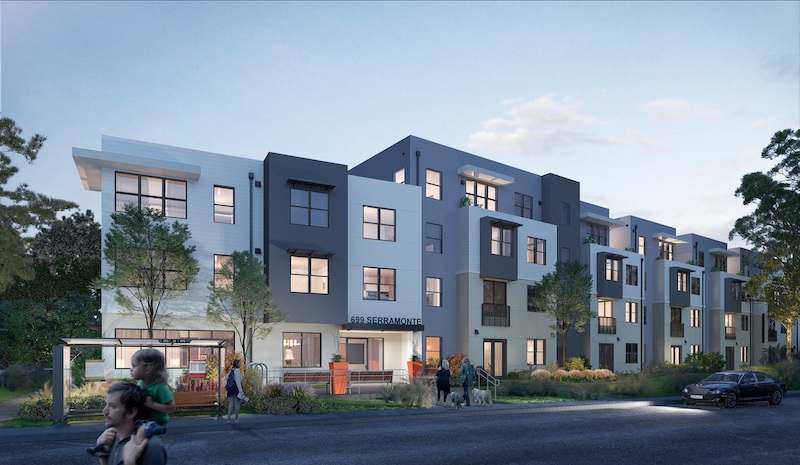The affordable housing shortage in the U.S. is particularly acute in California, where less than one-third of the state’s households can afford a median-priced home that now tops $600,000, or more than twice the national average.
School districts in California’s priciest regions have had trouble attracting and holding onto K-12 teachers whose midrange annual salaries, statewide, are from $67,032 to $87,373 for high school districts; $65,210 to $81,840 for elementary school districts; and from $63,243 to $74,676 for Unified School Districts, according to the California Department of Education.
An analysis last year by EdSource found that in 47 Bay Area school districts, even the highest-paid teachers could only afford a one-bedroom apartment.
To address this need, several of the state’s counties and school districts—including those in Santa Clara, San Francisco, Sonoma County, West Contra Costa, and Mountain View—have either approved the construction of affordable housing for teachers and staff, or are considered it.
One of these districts is Jefferson Union High School in Daly City, where in June 2018 voters approved Measure J, a $33 million general obligation bond to help pay for the construction of affordable apartments for teachers and staff, a first for this state.
This $61 million Serramonte Faculty and Staff Housing project for Jefferson Union High School District broke ground on February 5, and its first units are scheduled to available in the spring of 2022. The facility will consist of 122 apartments, with 59 one-bedroom, 55 two-bedroom, and eight three-bedroom units. The homes will range from 640 to 1,270 sf. Most important, the units’ rent rates will be 50% of market rates at the time occupancy.
J.H. Fitzmaurice, a general contractor based in Emeryville, Calif., is the GC on this project, which SVA Architects designed. The school district, comprised of five schools and a Youth Health Center, has just under 4,900 students, according to the latest data.
A September 2017 survey of the district’s employees (48.5% of whom were tenured teachers), found that 25% of 266 respondents said they were “very interested” in employee housing, 14% were “somewhat interested,” and 24% “would consider” leasing. At the time of the survey, 41.2% of 262 respondents said they owned their homes.
Nearly one-quarter of total respondents were paying between $2,000 and $2,499 per month in rent or mortgage, 13.2% were paying $2,500 to $3,000, and 12.8% were paying more than $3,000. That translated to 29.7% of respondents who were spending 31% to 40% of their household monthly incomes for rent or mortgage, 17.7% paying between 41% and 50% of their incomes, and 13.5% paying more than 50%.
Related Stories
MFPRO+ News | Jun 3, 2024
Seattle mayor wants to scale back energy code to spur more housing construction
Seattle’s mayor recently proposed that the city scale back a scheduled revamping of its building energy code to help boost housing production. The proposal would halt an update to the city’s multifamily and commercial building energy code that is scheduled to take effect later this year.
Resiliency | Jun 3, 2024
Houston’s buyout program has prevented flood damage but many more homes at risk
Recent flooding in Houston has increased focus on a 30-year-old program to buy out some of the area’s most vulnerable homes. Storms dropped 23 inches of rain on parts of southeast Texas, leading to thousands of homes being flooded in low-lying neighborhoods around Houston.
MFPRO+ New Projects | May 29, 2024
Two San Francisco multifamily high rises install onsite water recycling systems
Two high-rise apartment buildings in San Francisco have installed onsite water recycling systems that will reuse a total of 3.9 million gallons of wastewater annually. The recycled water will be used for toilet flushing, cooling towers, and landscape irrigation to significantly reduce water usage in both buildings.
MFPRO+ News | May 28, 2024
ENERGY STAR NextGen Certification for New Homes and Apartments launched
The U.S. Environmental Protection Agency recently launched ENERGY STAR NextGen Certified Homes and Apartments, a voluntary certification program for new residential buildings. The program will increase national energy and emissions savings by accelerating the building industry’s adoption of advanced, energy-efficient technologies, according to an EPA news release.
MFPRO+ News | May 24, 2024
Austin, Texas, outlaws windowless bedrooms
Austin, Texas will no longer allow developers to build windowless bedrooms. For at least two decades, the city had permitted developers to build thousands of windowless bedrooms.
Mass Timber | May 22, 2024
3 mass timber architecture innovations
As mass timber construction evolves from the first decade of projects, we're finding an increasing variety of mass timber solutions. Here are three primary examples.
Mixed-Use | May 22, 2024
Multifamily properties above ground-floor grocers continue to see positive rental premiums
Optimizing land usage is becoming an even bigger priority for developers. In some city centers, many large grocery stores sprawl across valuable land.
MFPRO+ News | May 21, 2024
Massachusetts governor launches advocacy group to push for more housing
Massachusetts’ Gov. Maura Healey and Lt. Gov. Kim Driscoll have taken the unusual step of setting up a nonprofit to advocate for pro-housing efforts at the local level. One Commonwealth Inc., will work to provide political and financial support for local housing initiatives, a key pillar of the governor’s agenda.
MFPRO+ News | May 21, 2024
Baker Barrios Architects announces new leadership roles for multifamily, healthcare design
Baker Barrios Architects announced two new additions to its leadership: Chris Powers, RA, AIA, NCARB, EDAC, as Associate Principal and Director (Healthcare); and Mark Kluemper, AIA, NCARB, as Associate Principal and Technical Director (Multifamily).
MFPRO+ News | May 20, 2024
Florida condo market roiled by structural safety standards law
A Florida law enacted after the Surfside condo tower collapse is causing turmoil in the condominium market. The law, which requires buildings to meet certain structural safety standards, is forcing condo associations to assess hefty fees to make repairs on older properties. In some cases, the cost per unit runs into six figures.

















